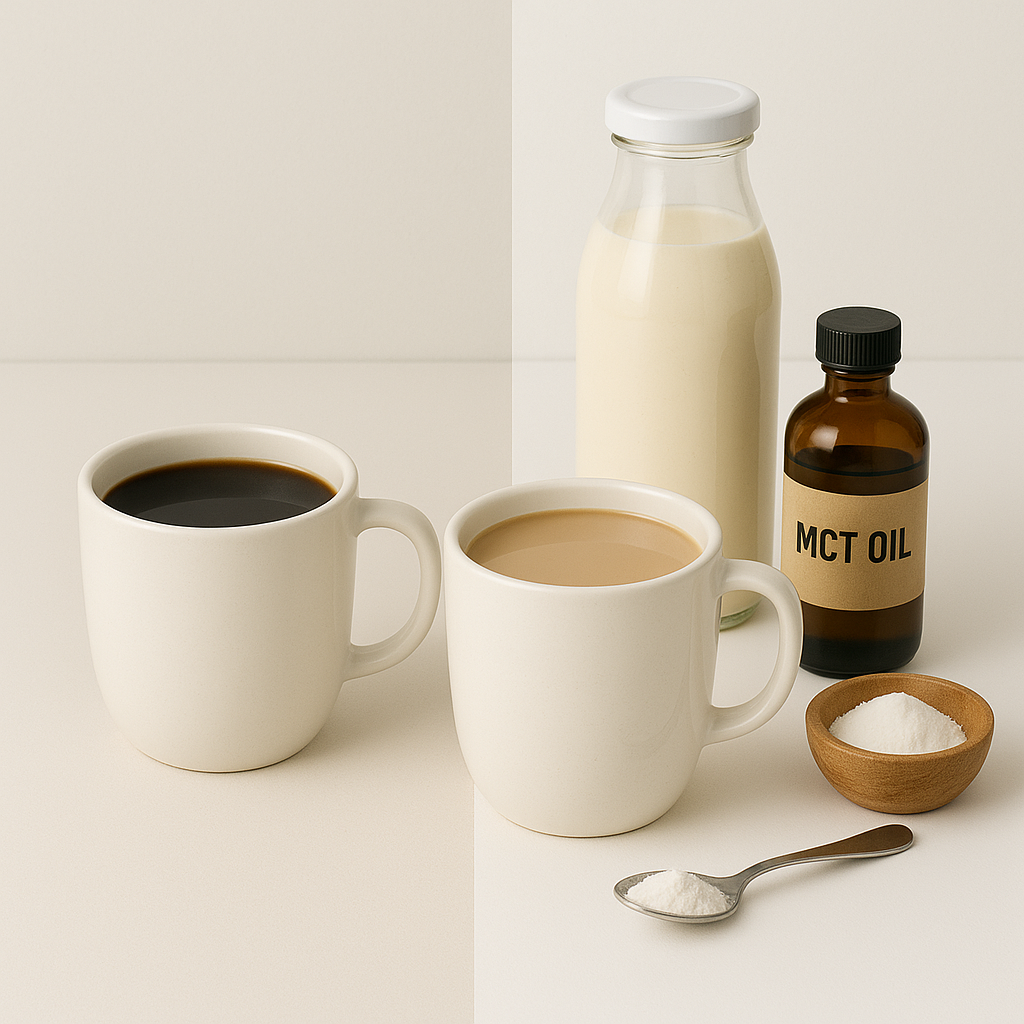Coffee Nutrition Facts: What’s Really Inside Your Morning Brew
What Do We Actually Mean by “Coffee Nutrition”?
Coffee has become more than a drink—it’s a daily ritual, a comfort, sometimes even a lifeline. But while we all know what it feels like to have a cup, not everyone knows what’s actually in it. Is coffee basically just hot water with flavor? Or does it offer something more when it comes to nutrition?
The truth is, coffee sits in a fascinating spot between “nothing much” and “quietly beneficial.” On one hand, it’s incredibly low in calories and contains no obvious macronutrients like fat or protein. On the other hand, it’s packed with hundreds of bioactive compounds that scientists are still working to fully understand.
Whether you’re curious about calories, antioxidants, or how oat milk changes the equation, this breakdown will help you understand what’s really inside your cup—and why it might matter more than you think.
Black Coffee Nutrition: Just the Basics
If you take your coffee black, you’re drinking something that’s about as light as it gets, nutritionally speaking. A regular cup—around 240 milliliters or 8 fluid ounces—has just one to two calories. These come from tiny traces of natural oils, a few amino acids, and a smidge of soluble fiber released during brewing. There are no carbohydrates, no sugars, no fats, and barely any measurable vitamins or minerals. In short, it’s not going to power your body like a meal—but that’s exactly the point for many people.
This minimal profile is part of what makes black coffee so appealing in certain contexts. If you’re fasting, eating low-carb, or just trying to keep your blood sugar steady, plain brewed coffee gives you the flavor and focus boost without shifting your metabolic state. That’s why it’s a go-to for so many people who are looking to stay light and clear-headed.
But just because coffee is low in calories doesn’t mean it’s empty. The real story lies in the compounds you can’t see—substances that may quietly support your health in ways that go far beyond macronutrient labels.
What Else Is Inside? Antioxidants, Acids, and Micronutrients
While black coffee doesn’t offer much in terms of calories or macros, it more than makes up for that with its complex mix of natural compounds. This is where things get interesting—not just for coffee lovers, but also for researchers studying how what we drink affects how we feel.
One of the standout components in coffee is a group of plant compounds called polyphenols, particularly chlorogenic acids. These antioxidants are believed to help protect cells from oxidative stress and may play a role in supporting metabolic health, inflammation balance, and even brain function. They’re part of what gives coffee its slightly tangy, rich flavor—and they’re not found in such high concentrations in many other beverages.
Coffee also contains trace amounts of minerals like magnesium, potassium, and a small dose of vitamin B2. The levels are nothing close to what you’d get from whole foods, but over several cups a day, these small amounts can add up to something meaningful—especially if coffee is a regular part of your routine.

Interestingly, the way coffee is brewed and even how it’s roasted can influence the concentration of these compounds. Lighter roasts, for example, often retain more chlorogenic acid, while darker roasts may have slightly more antioxidant activity through other pathways. Brewing methods like espresso or pour-over can also affect how much of these compounds make it into your cup.
All this doesn’t make coffee a multivitamin, of course. But it does help explain why many nutrition researchers now view it as more than just a caffeine delivery system. In its pure form, coffee is a plant-based, low-calorie drink packed with subtle but biologically active compounds. And that’s before we even talk about what happens when you start adding things to it.
How Add-Ins Change the Nutrition Game
Here’s where the story of coffee nutrition takes a sharp turn. Because while black coffee is nearly calorie-free and metabolically neutral, adding even a little something to it—like milk, sweeteners, or oil—can completely shift what’s going on in your cup.
Let’s start with milk. A generous splash of whole milk adds around 20 to 30 calories, mostly from fat, sugar (lactose), and protein. That doesn’t sound like much, but if you’re having multiple cups a day, it adds up quickly. Oat milk? It might seem lighter, but many brands are surprisingly high in carbohydrates—some sweetened versions contain as much sugar as soda. Even plant-based options that seem “clean” often contain gums, oils, or added flavors that can nudge your system in unexpected ways.
Sugar, of course, is the biggest nutritional pivot. A teaspoon of sugar adds about 16 calories, all from simple carbs. More importantly, it can cause quick blood sugar spikes and dips that leave you feeling energized—then suddenly drained. If you’re using multiple teaspoons or flavored syrups, your morning coffee is basically turning into a dessert.

Then come the trendy upgrades: collagen powder, protein, butter, MCT oil. These add not just calories, but functional effects—some people use them intentionally to promote satiety, boost focus, or support low-carb diets. And in the case of MCT oil, research suggests it may even support ketone production and mental clarity. You can learn more in our article on how MCT oil changes the game in Bulletproof coffee.
All of this isn’t to say you shouldn’t add things to your coffee. It’s about being aware of what you’re really drinking. A black cup of coffee and a vanilla oat milk latte might both start with beans and water—but nutritionally, they live on completely different planets.
Does Coffee Offer Any Functional Health Benefits?
When people talk about the health benefits of coffee, they’re often thinking beyond its caffeine kick. And while it’s easy to get caught up in trends—like calling it an antioxidant powerhouse or a brain booster—the truth is a little more balanced. Coffee isn’t a miracle drink, but it does seem to offer real, measurable effects when consumed in moderation.
Several studies have looked at coffee’s potential role in supporting metabolic health, with some showing links between regular coffee consumption and reduced risk of type 2 diabetes, as reviewed in the Nutrition Reviews (2018). Others have focused on liver function, with research suggesting that compounds in coffee may help protect against liver inflammation and fatty liver disease, as highlighted in Nutrients (2021). There’s even growing interest in how coffee might support brain health over time, especially thanks to its polyphenols and natural anti-inflammatory properties.

That said, coffee works best as part of a bigger picture. It’s not going to reverse poor sleep or an ultra-processed diet. But in the context of a balanced routine, your daily brew could quietly contribute to long-term wellness—without needing to be dressed up as a “superfood.”
In other words, it’s not just about caffeine. It’s the whole package: the plant compounds, the subtle micronutrients, and the way it fits into your life. And the best part? You don’t have to change a thing about how you enjoy it to get those quiet benefits.
So, What’s Really in Your Coffee?
Surprisingly, quite a bit. On its own, black coffee is virtually calorie-free—but it’s far from empty. It contains antioxidants like chlorogenic acids, trace amounts of minerals, and even some B vitamins. These compounds don’t turn your cup into a superfood, but they do offer small, meaningful benefits—especially when enjoyed regularly and in moderation.
Of course, what you add to your coffee matters too. Cream, sugar, flavored syrups, even trendy boosters like collagen or MCT oil—all of these can transform its nutritional profile. That’s not necessarily a bad thing, but it’s worth being mindful. With every tweak, your coffee becomes more than a brew—it becomes a choice.
So yes, your morning coffee may be simple—but it’s also richer than it seems. And knowing what’s really inside the cup helps you enjoy it with more clarity, more intention, and maybe even more appreciation.

